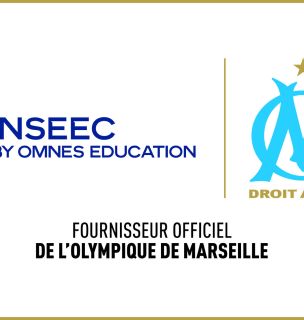“Whether it’s an agency or an advertiser, digital marketing skills are increasingly in demand. Becoming an expert in digital marketing requires above all a solid marketing and commercial background.”
Program Director – Paris Campus
Why choose the MSc Digital Marketing & E-Commerce training ?
Digital marketing professions are nevertheless tending to become more and more specialized. For a brand to gain visibility and notoriety, the “marketer” must demonstrate creativity while knowing how to develop technical skills that will allow him to conquer and retain new clients. Companies are waiting for well-trained employees, aware of the notion of return on investment. By definition, everything becomes more measurable and therefore all marketing actions can be optimized. The MSc in Digital Marketing & E-Commerce responds to specific market expectations. The emphasis is placed as much on the expertise of organic levers as on paid levers. The program aims to train future employees in business techniques while developing a critical mind regarding future technological developments.
Program objectives
- Design the digital communication and marketing strategy aligned with the company’s general strategy
- Manage digital marketing campaigns
- Design and deploy the digital communication policy
- Manage digital projects in agile mode and manage teams
- Coordinate and deploy the e-commerce strategy

A degree in 1 or 2 years to become a marketing expert
- 1st year of MSc: 441 hours
- 2nd year of MSc: 441 hours
Training languages
The programme is available in French on all of our campuses and in 100% English on the Lyon Campus (1st and 2nd year) and Paris (2nd year of the MSc only). In French, the programme is called “MSc Marketing & E-Commerce”.
How to apply for the MSc Digital Marketing & E-Commerce at INSEEC ?
The required prerequisites
The conditions for accessing the certification system (excluding VAE) are :
- For entry into the 4th year (MSc 1): have validated a level 6 qualification, Bachelor’s degree or equivalent in the field of marketing, business, communication or technical training types in digital.
- For entry into the 5th year (MSc 2): having validated a level 6, Master 1 or equivalent in the field of marketing.
The Executive training is subject to specific prerequisites with consideration of professional experience.
Want to know more about the MSc Digital Marketing & E-Commerce programme ?
Would you like to know more about the admission conditions for our program in Digital Marketing & E-Commerce ?
Quels sont les cours du Master of Science Marketing Digital & E-Commerce ?
The courses presented below are given as an example, they may vary slightly depending on the teaching campus. The content of the courses is adapted each year to changes in the market and is updated before each start.
1st year courses
TRANSVERSAL & FUNDAMENTAL COURSES – 1ST YEAR
BUSINESS ENGLISH
Perfect comprehension and communication techniques in the English language in a communication context.
BUDGET MANAGEMENT & DASHBOARDS
The objective is to acquire key skills in terms of budget management and reporting. Particular emphasis will be placed on the budget architecture, with the implementation of summary documents, project management control and its link with budget management, the production and management of dashboards.
SOFTWARE & DECISION-MAKING TOOLS
This module aims to deepen the skills of learners in IT to meet the demand of companies in terms of budget or commercial monitoring, project management, personnel management and communication: Excel, Word, PowerPoint, team work tools, business software. It aims to be efficient with office tools, quickly identify and correct errors, customize existing tools or create your own tools.
TOOLS & PROFESSIONAL METHODS
This module allows learners to improve their CV and their posture, notably through simulations (business game, professional simulation, speaking, etc.); practical and professionalizing workshops (CV, professional social networks, coaching, etc.) as well as professional and master class conferences.
CORPORATE STRATEGY & BUSINESS PLAN
This module allows you to develop the concepts and practice around business strategy. The elements of the business plan are addressed and allow to project into business creation.
SPECIALIZED COURSES
DIGITAL COMMUNICATION
- Define and implement a digital communication strategy to optimize interactions between different channels (advertising, blog, advertgaming, social networks, content sharing, etc.).
- Implementation of digital solutions integrated into global communication, and generating value.
TECHAWAY : STRUCTURE THE DATA & GENAI
- Address the fundamentals of data manipulation and generative artificial intelligence.
- Explore the power of Google Sheets to organize, analyze and visualize data, while integrating no-code tools to automate processes.
- Particular attention is paid to prompt engineering, in order to create effective interactions with AI systems.
- This course is aimed at both beginners and those wishing to deepen their skills, providing them with the necessary tools to optimize their workflow through AI.
CUSTOMER RELATIONS MANAGEMENT (CRM)
- The “Customer Relations Management” (CRM) module trains learners to design and implement effective customer relationship management strategies.
- Participants will learn how to analyze customer data, segment markets, personalize interactions, build customer loyalty and measure customer satisfaction.
- They will study CRM tools, relationship marketing techniques and communication strategies adapted to each stage of the customer journey.
- Particular attention will be paid to ethics and personal data protection.
- At the end of this module, students will be able to develop innovative CRM strategies adapted to the specific challenges of each company.
DATA & MARKETING DIGITAL
Through case studies, this module aims to master the tools specific to marketing and communication on the Internet, mainly addressing:
- The latest trends in e-commerce (m-commerce / f-commerce…).
- The integration of Web 2.0 into marketing strategies.
- Presentation and mastery of Web analytics tools.
- Development of a marketing and commercial strategy on the different social media.
E-BUSINESS
This module aims to give students an overview of e-commerce. It is about introducing them to the challenges of online sales, to take a look at the specificities of an e-commerce site, its content and animation.
LEGAL ENVIRONMENT OF E-COMMERCE
- Know the positioning of the company in the legal environment.
- Know the legal constraints governing online commerce, and more broadly business on the internet.
FOCUS MARKETS & PRODUCTS
- This course explores the close links between market analysis and product development.
- It addresses market research methods to understand consumer needs and expectations, as well as techniques for designing and launching new products or services.
- Learners will see how to identify market opportunities, define product positioning, develop a marketing plan and measure launch success.
- They will also be made aware of the challenges of innovation, social and environmental responsibility, and ethics in product development.
INTRODUCTION TO DIGITAL TRANSFORMATION
- The introductory course on digital transformation aims to familiarize learners with the issues and challenges of the digital transformation of organizations.
- Participants will discover key concepts, emerging technologies (AI, IoT, Big Data, etc.) and implementation methodologies.
- They will study the impact of digital transformation on business models, business processes, customer experience and corporate culture.
- Particular attention will be given to the strategic, organizational and human aspects of digital transformation.
- At the end of this module, learners will be able to understand the challenges of digital transformation and contribute to its implementation within an organization.
DIGITAL PROJECT MANAGEMENT
- This module aims to raise the student’s awareness of the universe of interactive professions.
- The central objective is to allow the student to assimilate the different phases implemented in the production process of an interactive medium and more specifically the websites.
CREATION PROCESS & GRAPHIC DESIGN
- Introduction to advertising creation.
- Understanding of the constraints of the different stakeholders in the graphics chain.
- Learning the fundamentals of Photoshop and Illustrator to produce advertising content.
- Implementation on real projects and case studies.
E-REPUTATION, MARKETING AUTOMATION & INBOUND
- The advent of social networks has shaken the reputation of companies, brands, products or services.
- Influencers have become the new brand ambassadors, but are they the only ones who have power over it?
- How to identify the actors and places where people talk about you?
- What actions should be taken to build awareness in line with your brand platform?
- Attracting your prospects to a company and turning them into customers, isn’t that the holy grail of any marketer?
- Digital brings many technological solutions that rely on a content strategy to make it a reality.
- We will develop in this course the creation of an Inbound Marketing strategy within his company to achieve this goal.
DIGITAL STRATEGY & SEO POLICY
- Presentation of the different existing SEO policies and their challenges;
- The key steps to build an SEA strategy adapted to an advertiser;
- The key steps to build an SEO strategy adapted to an advertiser.
WEB ANALYTICS
- Overview of website creation solutions (CMS, PHP development, WYSIWYG tools…).
- Presentation of the different tools for analyzing website traffic, main indicators: origins, conversion rate, time spent…
EXAMS
WRITTEN EXAMS
The 2nd year courses
DIGITAL COMMUNICATION & MARKETING STRATEGY – 2ND YEAR
APPLIED RESEARCH DISSERTATION
- Allow learners to know the expectations of the applied research thesis.
- Formulate an issue, build a review of the literature, choose the methodology of the study, issue recommendations.
DIGITAL STRATEGY
- Knowledge and acquisition of a single and/or multi-channel clientele.
- Develop the development, animation and integration capabilities of the offer in a multichannel context.
LAW APPLIED TO THE WEB & NEW TECHNOLOGIES
- The right associated with email, cyber distribution or the right related to e-merchants.
- Consumer protection;
- The legal management of the DBDs;
- Trademark law, and issues related to computer security.
ONLINE MEDIA PURCHASES
- Know the different aspects of digital advertising.
- Build your advertising communication strategy step by step.
- Set up, evaluate and optimize the ROI of a campaign.
MANAGEMENT OF DIGITAL MARKETING CAMPAIGNS
CUSTOMER RELATIONSHIP MANAGEMENT
- The “Customer Relationship Management” (CRM) module trains learners to design and implement effective customer relationship management strategies.
- Participants will learn how to analyze customer data, segment markets, personalize interactions, build customer loyalty and measure customer satisfaction.
- They will study CRM tools, relationship marketing techniques and communication strategies adapted to each stage of the customer journey.
- Particular attention will be paid to ethics and personal data protection.
- At the end of this module, learners will be able to develop innovative CRM strategies adapted to the specific challenges of each company.
E-MAILING : PERFORMANCE & DESIGN
- Understanding of the phases and various aspects of email sending management, understanding and mastering of different sending techniques as well as their recent developments.
- The ability to optimally manage deliverability as well as the analysis of campaign performance statistics.
SEA
- Understand how sponsored links and Google Ads work.
- Set up a campaign with Google Ads.
- Manage a campaign and track performance.
SEO & SMO
The objective of this module is to give the keys to understanding the challenges of SEO (Search Engine Optimization). Managing your online presence becomes a real lever for communication and growth of the company.
ACQUISITION STRATEGY
- Master the specificities of digital marketing ROI.
- Establish a diagnosis of the strategy.
- Measuring the impact of campaigns.
DIGITAL COMMUNICATION POLICY
BRAND CONTENT & STORYTELLING
- Raise awareness among students about the transmedia storytelling approach and the impact of new technologies on our media consumption and brand communication.
- Teach them the basics of brand storytelling.
- Introduce them to virtual reality, augmented or mixed reality.
COMMUNITY MANAGEMENT & SOCIAL MEDIA STRATEGY
- Know the techniques of community management:
- Identification of networks of influence, good practices and uses of the main actors.
- Optimize brand awareness and its e-reputation through controlled and optimized communication on social networks.
TECHAWAY : AUTOMATION & DATABASE
- Be able to help marketing professionals leverage the power of code-free tools to automate and optimize their strategies.
- Using platforms like Make and Airtable, learn how to connect different applications to create custom workflows and efficiently manage databases tailored to their needs.
- Develop skills in data structuring and analysis, while discovering how code-free automation can accelerate marketing decision making and improve project management without requiring programming knowledge.
AFFILIATION & INFLUENCE STRATEGY
- Knowledge and understanding of the affiliation market.
- Knowledge of the levers used.
- Know how to integrate an affiliation strategy into your web acquisition mix.
DIGITAL PROJECT MANAGEMENT
TOOLS & PROFESSIONAL METHODS
- This module allows learners to improve their resume and their posture through, in particular, role-playing exercises (business games, professional simulations, speaking sessions, etc.);
- Practical and professionalizing workshops (CV, professional social networks, coaching, etc.) as well as career conferences and master classes.
UX DESIGN
- Understand the steps involved in carrying out an educational project, the stakeholders and their role.
- Know how to identify the target users and their needs.
- Define paths and key conversion levers.
- Illustrate and present the functional biases.
UI DESIGN
- Allow students to acquire basic skills in Photoshop and Illustrator software in order to meet the requirements of companies during their internship.
- Know how to use the appropriate software(s) according to the request.
- Discover industry standard tools and specific project deliverables in the UI.
- Understand the definition and principles of UI/UX design in order to design with intent.
AGILE METHODS & INNOVATION
- The module of “Agile Methods and Innovation” explores agile approaches to manage innovative projects.
- Learners will see how to apply agile principles such as Scrum and Kanban to optimize product and service development.
- They will study agile project management tools, creativity techniques and problem solving methods to foster innovation.
- Particular attention will be paid to team collaboration, adaptation to change and customer satisfaction.
- At the end of this module, learners will be able to manage innovative projects in an agile and efficient manner.
E-COMMERCE STRATEGY
DESIGN & DEVELOPMENT OF AN E-COMMERCE SITE
- The course of “Design and Development of an Ecommerce Site” trains learners to create effective online sales platforms.
- Participants will learn how to design the architecture of an e-commerce site, develop essential functionalities (product management, shopping cart, online payment, etc.) and optimize the user experience. They will study web technologies (HTML, CSS, JavaScript, PHP, etc.), content management systems (CMS) and existing ecommerce platforms.
- Particular attention will be paid to natural referencing (SEO), security and sales data analysis.
- At the end of this module, learners will be able to create and manage a complete and efficient e-commerce site.
WEB ANALYTICS & PERFORMANCE MEASUREMENT
- This module addresses the issues surrounding the audience of a website (also called Web Analytics) allowing to quantify the attendance of a site based on indicators such as the number of unique visitors, pages viewed, visits, average duration of visits, etc.
- Campaign plan.
- Development and animation of the paper catalog.
- Design and marketing of digital catalogs.
- Customization systems.
- Dual distribution, communication and integrated sales promotion.
- Multichannel cultures and organization.
- Transposition and adaptation of merchandising techniques to the web.
SOFTWARE DEDICATED TO THE PRODUCTION OF A MERCHANT SITE
- The module “Software dedicated to the production of commercial sites” trains learners to master the tools and technologies to create efficient e-commerce sites.
- The participants will study the different types of software (CMS, e-commerce platforms, open source solutions, etc.), their functionalities (product management, orders, payments, etc.) and their specificities (scalability, security, customization, etc.).
- They will learn to choose the solutions adapted to the needs of each project, to configure them, to customize them and to integrate them with other tools (CRM, ERP, marketing automation, etc.).
- Particular attention will be paid to the technical, ergonomic and marketing aspects of merchant sites.
- At the end of this module, learners will be able to design, develop and manage professional e-commerce sites.
WRITTEN EXAMS & DEFENSE
EXAMS
- Written exams
- Thesis defense
What are the beginnings and study schedules ?
Two intakes per year are organized, in February/March and September/October. To check the opening of each school year, contact the admissions service directly.
The pace of courses can differ depending on the campus and whether the training is carried out under an internship agreement (initial) or a professionalization/learning contract (continuous).
The work-study contract must be signed for a period of 12 months (MSc2) or 24 months (MSc1 + MSc2).
To find out the duration of the contract during the delayed start period, contact the campus admissions service that interests you directly.

What are the career opportunities after a MSc in Digital Marketing & E-Commerce ?
- Head/Director of Communication and Digital Marketing
- Digital Marketing Manager/Director
- Manager/Director of digital communication
- Webmarketing project manager
- Manager, Head of digital SEO strategies (SEO, SEM, SEA)
- Traffic manager
- E-commerce manager
To consult the detailed job sheets by specialization.
What are the business skills blocks developed for the title RNCP Manager of Communication and Digital Marketing ?
Professional certification allows the preparation of the following blocks of skills :
- Design the digital communication and marketing strategy aligned with the overall company strategy
- Drive digital marketing campaigns
- Design and deploy the digital communication policy
- Manage digital projects in agile mode and manage teams
In addition to these common blocks of competences, the following optional sectoral block is added:
- Coordinate and deploy the e-commerce strategy
Description of the procedures for acquiring certification by capitalization of skill blocks and/or correspondence
Certification is obtained by :
- The validation of four blocks of skills common to all courses (obtaining a score greater than or equal to 10/20 for each block of skills)
- The completion of a corporate period of at least 132 days during the second year of the course (MSc 2)
Professional certification
Professional certification of « Manager of Communication and Digital Marketing », code NSF 312, issued by INSEEC MSc (CEE-SO, CEE-RA, CEFAS, MBA INSTITUTE, CEE-M, CEE-OUEST), registered under number 39592 at the RNCP (National Directory of Professional Certifications) by decision of the Director General of France Compétences of October 1, 2024.
The certification is issued by capitalisation of the totality of the blocks of competences. Each competency of a block must be validated to validate the block of competencies. Partial validation of a block is not possible. It is also accessible through the Validation of Acquired Experience.
Find the skill blocks associated with this RNCP title by clicking here.
What are the educational methods of the MSc in Digital Marketing & E-Commerce ?
Teaching methods
- Lectures and interactive courses.
- Situational exercises through collective and/or individual case studies carried out by the students.
- Conferences, seminars and/or educational visits.
Evaluation methods
- Individual and/or group case studies
- Individual and/or group oral presentations
- Individual and group papers
- Research dissertation with an individual oral presentation
Methods and tools
- The evaluation methods are face-to-face, in the form of continuous assessment or final exams in the form of mid-term exams.
What are the 2025/2026 tuition fees for joining the MSc Digital Marketing & E-Commerce training ?
FALL INTAKE – 2025
Initial training:
- MSc1: €10,990 before tax
- MSc2: €12,950 before tax
Apprenticeship program:
- 24 months: €23,490 before tax
- MSc2: €13,890 before tax
International students pack
Mandatory fee of €700 for exclusive support services for international students living outside the European Union.
SPRING INTAKE – 2026
Initial training:
- MSc1: €10,990 before tax
- MSc2: €12,950 before tax
Apprenticeship program:
- 24 months: €23,490 before tax
- MSc2: €13,890 before tax
International students pack
Mandatory fee of €700 for exclusive support services for international students living outside the European Union.
In the context of work-study training, tuition fees are payable by the OPCO and the company signing the contract.
Do you have any questions about work-study or our school in general? Consult our frequently asked questions.
VAE/VAP
- VAE: €4,800 before tax
- VAP: €850 before tax
International students pack
Mandatory fee for exclusive support services for international students living outside the European Union.
- Fall intake (2025) – September/October: €700
- Spring intake (2026) – February/March: €700
Application fee
The application fee is €80.
What kind of financial help is available ?
INSEEC offers several financial aid schemes :
- The alternating rhythm, in internship or work-study contract;
- The right to training via the CPF;
- Banking partnerships.
the key figures for the RNCP title "MANAGER de la communication et du Marketing digital"
95%
National success rate – Promo 2024
98%
Rate of presentation – Promo 2024
68%
Overall insertion rate (233 respondents out of 688) – Promo 2023
78%
6-month satisfaction rate – Promo 2023
*The details are available on this document made available to you (national results and by regional certifier).
What is the Disability policy in our school ?
The OMNES Education Group pays particular attention to the societal environment, including the disability dimension. Indeed, we believe that students with disabilities should not have any problems in pursuing their studies and starting a professional career. We accompany them to facilitate their access to the premises, offer them personalized advice as well as adapted accommodations throughout their school career.
Accessibility of premises: all our campuses are accessible to people with disabilities.
To learn more about the OMNES Education Group’s disability policy, click here.
Contacts for disability referents by campus:
- Bordeaux: Maxime DOUENS – mdouens@inseec.com
- Lyon: Anissa GASMI – agasmi@inseec.com
- Rennes: Laura LE CALVEZ – llecalvez@omneseducation.com
- Paris: Farid HAMAD – fhamad@inseec.com
- Chambéry: Marianne FERLAY – mferlay@inseec-edu.com
- Marseille: Océane VALOTTI – ovalotti@omneseducation.com
- Toulouse: Amanda MARNEIX – amarneix@omneseducation.com
News

June 2024
INSEEC hosted the CFNews Grands Prix de la Croissance Externe Sud Ouest for the second year running
Read more





